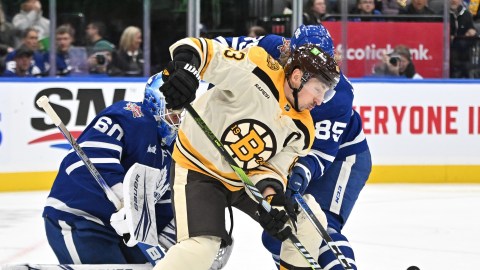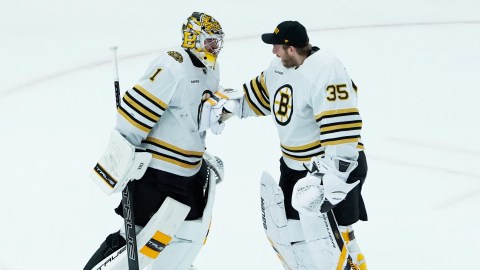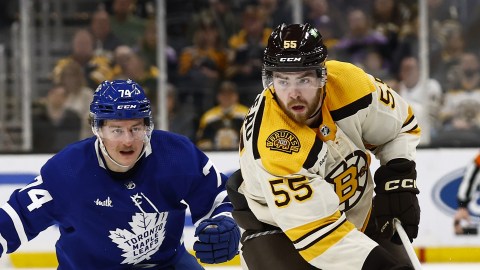They stood on the loading dock behind the RBC Center in Raleigh, N.C., one by one, spread-eagled, as the TSA-approved security people waved the wands around them. The Bruins wore expressions that combined embarrassment, disgust and enthusiasm as dampened as the rain-soaked cement beneath their shoes.
They were boarding the bus to take them to their charter flight home to Boston following a blowout 5-1 loss to the worst team in the NHL, the Carolina Hurricanes.
Thus began a leg of a journey no one in the organization had imagined that they would have to take. They are going to have to trust someone they don't yet know to grab the yoke and show them how to fight through the clouds to clear air.
Change is coming. It has to. Last season's top Eastern Conference team gave up a 36-goal scorer in Phil Kessel but returned every other substantial attribute. The Bruins let Stephane Yelle go to make room for Steve Begin; they moved Aaron Ward so that they could afford Derek Morris. Chuck Kobasew was moved to Minnesota early on, essentially replaced by Daniel Paille. Yes, David Krejci was coming off surgery, but he, Michael Ryder and Blake Wheeler had found a magical touch in all kinds of circumstances — and Wheeler was stronger and a year more learned. Plus Krejci, when fully healthy, would be better. There was every reason to think that the 2010 Boston Bruins would not only be as good as the regular-season conference champs, but would be built for a longer, stronger playoff run.
Instead, they have been one of the NHL's biggest disappointments.
This is not to say that the 2010 season is a lost cause or that all optimism has been dashed. The potential certainly remains, and the fulcrum of their most dangerous lever, Marc Savard, is approaching the point that he can get his damaged knee back into the lineup. But Savard isn't going to be a cure-all. His mere presence isn't going to shock to life a team that had little or no response to Carolina's surprising 1-0 lead midway through the first period on Sunday.
The Bruins are not hard to play against right now. They haven't had a stretch of eight or 10 games in which they have kicked other teams' butts the way contending teams all do. They haven't jumped out to early leads and spent the rest of the night just pummeling any idea of hope out of opponents. Oh, yes, they did do that to Carolina in the second game of the season, but that was in their down-up, down-up start — which, as I write this in turbulence shortly after takeoff, seems to be an oddly appropriate memory. Sort of makes you want to puke.
This team lacks a weapon that makes opponents wonder, "Holy smokes, what are we going to do to stop him/them?" A line that, every time it is on the ice, makes the opponent play with at least some fear of failure or — better for the Bruins — humiliation. A blunt instrument or a scalpel. A bomb or an ice pick. A combination of players who set an unforgiving, unrelenting, unsympathetic tone of "We're going to beat you on the scoreboard but also leave scars that beat up your will to play us ever again."
Ilya Kovalchuk, you say? Yup, he's out there. Atlanta would be at least ill-advised, perhaps idiotic, not to move him before he walks away via unrestricted free agency on July 1. The Thrashers can't possibly afford him with the empty seats they're drawing. Atlanta once again looks as if it will not be making a playoff appearance, and if it does, the Thrashers are likely to get a quick dismissal.
Kovalchuk may demand a "max cap" deal to stay in North America, which equates to 20 percent of what a team can spend in a season. That leaves a GM to fit 22 other players under the 80 percent remaining in his cap, which means the team is a wreck waiting to happen (and what if the previously durable Kovalchuk gets hurt?).
If a team makes the deal with Atlanta, can it keep Kovalchuk at all beyond 2010? Don't forget, about 20 percent of players' current salaries are being escrowed in order to cover possible shortfalls in gross receipts (because NHL owners don't have to pay more than a certain percentage of the gross in total salaries paid out). That turns his $10 million annual salary into $8 million before taxes. Taxes chop it to about $5 million take-home.
That pales compared to the rubles this guy is being offered. If Kovalchuk goes home to Russia, the KHL supposedly is ready to pay him $12-15 million dollars per season (tax free, thank you, Mr. Putin/Medvedev/Khrushchev's ghost/whoever is the dictator of "democracy" in Moscow these days). So if Kovy is looking for the most money, might as well bid him do svidaniya, and thanks for costing us a core young player, another good one and a high draft choice. And you thought rents on Beacon Hill were high.
If Kovalchuk were to accept his new NHL team's lower-than-Russian-money bid in the summer of 2010 — and that assumes he finds happiness in his new home and doesn't bolt to an NHL rival, inspiring GM suicide — he not only will require the buyer to blow up the existing plan to accommodate his gigantic salary but also will force a continual purge of developing young players who won't fit under the cap when they gain restricted free agent rights (see: Kessel, Phil). And that would go on, year after year, until the end of his deal.
And still it's tempting. Because every time Ilya Kovalchuk swings his legs over the boards, the vendors sell nothing, goalies get queasy, defensemen suffer palpitations and goal judges get ready to flip on the red light.
Kovalchuk may not be the answer, but the Bruins have to do something to create fear in their adversaries. Opponents are unafraid to play this team right now. The "Boston" dates on the schedule that used to inspire cold sweats now lead to feelings of "no sweat."
So Peter Chiarelli recalls chemistry classes of his youth and tries to figure out how to build a combination that is explosive, but only goes off when you want it to. He has to hope he doesn't inadvertently blow up everything he has built.
We rocket through this East Coast rainstorm, getting bounced around like acid in a general manager's gut. The Bruins are in ninth place in the Eastern Conference. By the time they play again, the mathematical possibility exists that in the span of one week they will have plummeted — like a 737 attempting to punch through a front — from fifth place to 13th. It seems probable that when they take the ice at Northeast Division-leading Buffalo on Friday, the Bruins will be at least as low as 11th .
One by one, the players went through screening before we got on this flight. In each of their eyes, there seemed to be the knowledge that the makeup of this team was about to change, perhaps radically. A friend and teammate is going to go. Maybe several of them will.
As the final player cleared the loading dock and headed for the bus, the screeners had not found a single weapon among them.



